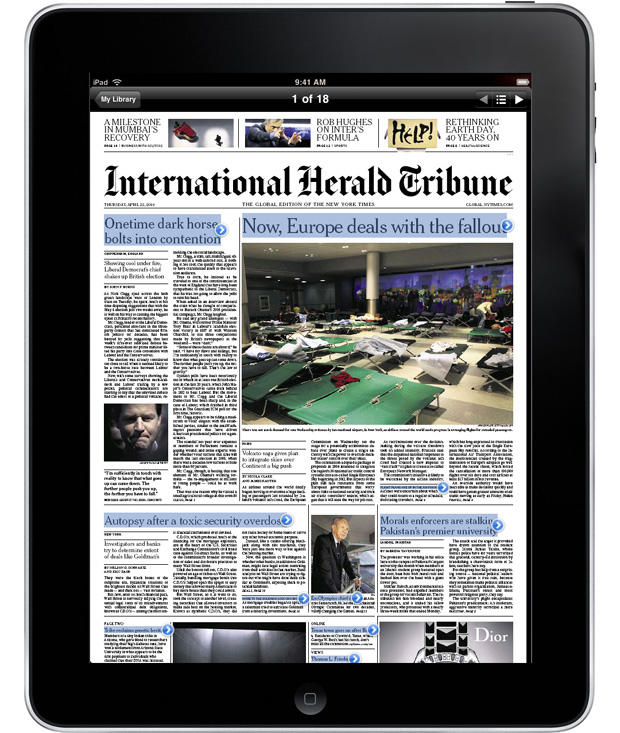Will the iPad kill — or save — the newspaper? Countless observers have argued both cases. I come to bury these notions, not to praise them.
The newspaper industry is suffering through a painful transition, characterized by layoffs, closures, mergers and the abandonment of mission and even dignity in the quest to maintain relevance to advertisers.
The “iPad-will-destroy-newspapers” crowd assumes that paper is the problem. Paper is expensive, slow and bad for the environment. Because the iPad delivers news cheap, fast and without the conversion of trees into trash, the public will choose iPad-based news, which will kill off newspapers.
The “iPad-will-save-newspapers” people, on the other hand, see the wide range of news-reading apps as the newspaper’s salvation. There’s some logic to this, given that the iPad is a theoretically superior advertising platform. But that’s not going to happen.
The trouble with both perspectives is that they miss the big picture. Newspapers don’t depend on paper, nor do they necessrily even depend even on advertising. The root enabler of the newspaper industry is the widespread cultural habit of using a newspaper as a source of information. That habit existed because newspapers were the most efficient source of specific kinds of necessary information.
Before the Internet, newspapers served a wide range of vital functions. They provided readers with news and information on major state, national and international events, as well as opinion about those events. Local newspapers provided location information as well.
Many newspapers were not only the best source but oftentimes the only source for most people of community news and calendars, classified ads, horoscopes, stock prices, obituaries, legal notices, movie show times, TV listings, comics, employment opportunities, advice, gossip and more.
The distribution of such information has been vital for democracy and for the enhancement of lifestyle. For more than a century, newspapers provided a majority of adults with all their basic information needs.
Of course, the Internet changed all that. Now the Web is by far the most efficient source for all of this information. There’s only one problem: Newspapers funded journalism.
In other words, the comprehensiveness and necessity of the information in newspapers almost required widespread readership, which brought in subscription revenue and made it a necessary advertising vehicle. That money paid the salaries of professional journalists, who provided an absolutely indispensable role in democracy.
We don’t need newspapers anymore for anything except as an employer of reporters and editors. Somebody’s got to pay these people, or democracy is in serious trouble.
What Is to Become of Newspapers?
The best analogy for understanding the fate of newspapers is that newspapers are the horses of our era.
A century ago, horses were the foundation of the transportation system, because they were the most efficient way to get around. Horses were everywhere. Middle class families owned them. Cities were designed with horses in mind, with stables, watering facilities, carriage houses, blacksmiths and everything else you needed to maintain and use a horse.
But in only two decades, cars took over. Gas stations proliferated, and amenities for horse maintenance were dismantled.
The world was re-made for cars, and un-made for horses. Habits, skills and interest were divested from horse culture and invested in car culture.
Now, you can’t ride a horse in a city, unless you’re a cop or participating in a parade.
What’s relevant here is not that horses are gone, but that they’re not gone.
Rich people have horses, as do horse fans and people with specific careers (police, breeding, rodeo, etc.).
And that’s what will happen to newspapers. The world is being re-made for Internet-delivered information, and un-made for newspapers. Habits, skills and interest are being divested from newspaper culture and invested in Internet culture.
In the future, only rich people, newspaper enthusiasts and people in specific jobs (government, academia, authors, etc.) will read them. And they’ll be very expensive (as are horses today).
Most importantly, the cultural habit of sitting down and spending an hour or two with an editor-determined collection of news and information will be replaced as a mainstream, every-day habit by the social media, YouTube-happy, blog-centric thing you’re doing right now. Some of that content will originate with newspapers.
Newspapers will live forever. However, local newspapers will die off. It’s just a matter of time before only big cities, states and nations have newspapers. Small and medium size towns will no longer have them.
Increasingly, many journalists will go independent. Some will be paid vast sums of money, as they should, selling their scoops and investigative pieces to the highest bidders. Others will continue to be underpaid and live on the edge of poverty. Many editorial staffs will be downsized and widely distributed (with staff working from home), following the Silicon Valley model of radical cost cutting.
Local newspapers will go away. A small number of larger newspapers will never go away. They’ll distribute on paper, on the Web, via apps — it doesn’t matter. It’s all going to be OK.
What does All This Have to Do with the iPad?
Absolutely nothing.
The iPad is just a medium — one of many. The newspaper industry is going to go through its inevitable transition, and the iPad has nothing to do with it. The moment the programmable electronic computer was invented, the fate of the newspaper industry was sealed.
If Apple had never invented the iPad, the newspaper industry would go through exactly the changes it’s now experiencing.
The iPad can and will neither destroy nor save newspapers. And anyone who tells you the iPad is a determining factor is simply misinformed.


